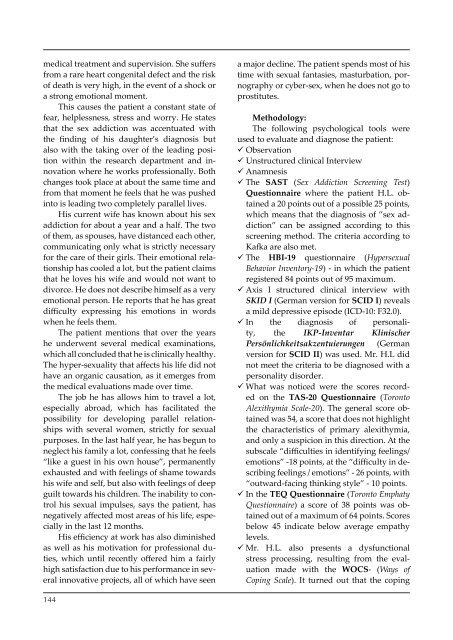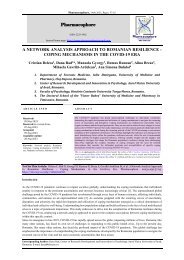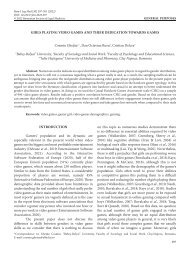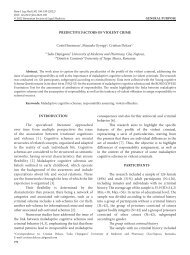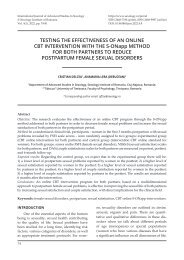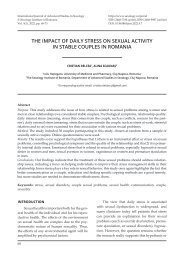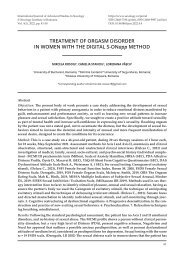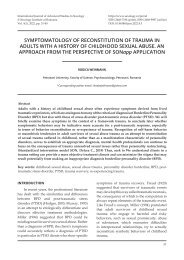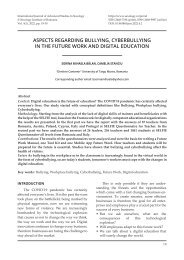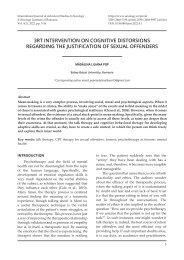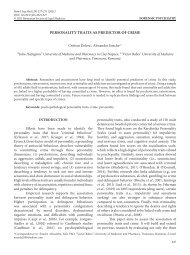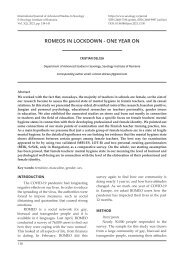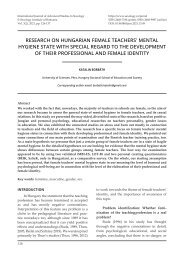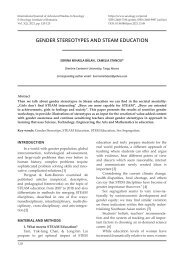Sex as a maladaptive coping mechanism in hypersexuality disorder
The confrontation with the controversial construct of sex addiction reveals not only the heterogeneity of the group of those affected, but also the multitude of aspects that must be taken into account when determining whether this is a singled out, independent disorder or not. Clinical practice experiences also highlight the diversity of relevant influencing factors to consider, as well as the importance of maladaptive coping mechanisms that sustain addiction. The case study presented in this paper was deliberately chosen because clinical cases have repeatedly shown that these two areas, the lack of privacy and the lack of access to their own feelings, play a decisive role in the development of addictions in patients, as well as in the maintenance of this addiction. Therefore, it requires increased attention in therapy.
The confrontation with the controversial construct of sex addiction reveals not only the heterogeneity of the group of those affected, but also the multitude of aspects that must be taken into account when determining whether this is a singled out, independent disorder or not. Clinical practice experiences also highlight the diversity of relevant influencing factors to consider, as well as the importance of maladaptive coping mechanisms that sustain addiction. The case study presented in this paper was deliberately chosen because clinical cases have repeatedly shown that these two areas, the lack of privacy and the lack of access to their own feelings, play a decisive role in the development of addictions in patients, as well as in the maintenance of this addiction. Therefore, it requires increased attention in therapy.
Create successful ePaper yourself
Turn your PDF publications into a flip-book with our unique Google optimized e-Paper software.
medical treatment and supervision. She suffers<br />
from a rare heart congenital defect and the risk<br />
of death is very high, <strong>in</strong> the event of a shock or<br />
a strong emotional moment.<br />
This causes the patient a constant state of<br />
fear, helplessness, stress and worry. He states<br />
that the sex addiction w<strong>as</strong> accentuated with<br />
the f<strong>in</strong>d<strong>in</strong>g of his daughter’s diagnosis but<br />
also with the tak<strong>in</strong>g over of the lead<strong>in</strong>g position<br />
with<strong>in</strong> the research department and <strong>in</strong>novation<br />
where he works professionally. Both<br />
changes took place at about the same time and<br />
from that moment he feels that he w<strong>as</strong> pushed<br />
<strong>in</strong>to is lead<strong>in</strong>g two completely parallel lives.<br />
His current wife h<strong>as</strong> known about his sex<br />
addiction for about a year and a half. The two<br />
of them, <strong>as</strong> spouses, have distanced each other,<br />
communicat<strong>in</strong>g only what is strictly necessary<br />
for the care of their girls. Their emotional relationship<br />
h<strong>as</strong> cooled a lot, but the patient claims<br />
that he loves his wife and would not want to<br />
divorce. He does not describe himself <strong>as</strong> a very<br />
emotional person. He reports that he h<strong>as</strong> great<br />
difficulty express<strong>in</strong>g his emotions <strong>in</strong> words<br />
when he feels them.<br />
The patient mentions that over the years<br />
he underwent several medical exam<strong>in</strong>ations,<br />
which all concluded that he is cl<strong>in</strong>ically healthy.<br />
The hyper-sexuality that affects his life did not<br />
have an organic causation, <strong>as</strong> it emerges from<br />
the medical evaluations made over time.<br />
The job he h<strong>as</strong> allows him to travel a lot,<br />
especially abroad, which h<strong>as</strong> facilitated the<br />
possibility for develop<strong>in</strong>g parallel relationships<br />
with several women, strictly for sexual<br />
purposes. In the l<strong>as</strong>t half year, he h<strong>as</strong> begun to<br />
neglect his family a lot, confess<strong>in</strong>g that he feels<br />
“like a guest <strong>in</strong> his own house”, permanently<br />
exhausted and with feel<strong>in</strong>gs of shame towards<br />
his wife and self, but also with feel<strong>in</strong>gs of deep<br />
guilt towards his children. The <strong>in</strong>ability to control<br />
his sexual impulses, says the patient, h<strong>as</strong><br />
negatively affected most are<strong>as</strong> of his life, especially<br />
<strong>in</strong> the l<strong>as</strong>t 12 months.<br />
His efficiency at work h<strong>as</strong> also dim<strong>in</strong>ished<br />
<strong>as</strong> well <strong>as</strong> his motivation for professional duties,<br />
which until recently offered him a fairly<br />
high satisfaction due to his performance <strong>in</strong> several<br />
<strong>in</strong>novative projects, all of which have seen<br />
a major decl<strong>in</strong>e. The patient spends most of his<br />
time with sexual fant<strong>as</strong>ies, m<strong>as</strong>turbation, pornography<br />
or cyber-sex, when he does not go to<br />
prostitutes.<br />
Methodology:<br />
The follow<strong>in</strong>g psychological tools were<br />
used to evaluate and diagnose the patient:<br />
Observation<br />
Unstructured cl<strong>in</strong>ical Interview<br />
Anamnesis<br />
The SAST (<strong>Sex</strong> Addiction Screen<strong>in</strong>g Test)<br />
Questionnaire where the patient H.L. obta<strong>in</strong>ed<br />
a 20 po<strong>in</strong>ts out of a possible 25 po<strong>in</strong>ts,<br />
which means that the diagnosis of “sex addiction”<br />
can be <strong>as</strong>signed accord<strong>in</strong>g to this<br />
screen<strong>in</strong>g method. The criteria accord<strong>in</strong>g to<br />
Kafka are also met.<br />
The HBI-19 questionnaire (Hypersexual<br />
Behavior Inventory-19) - <strong>in</strong> which the patient<br />
registered 84 po<strong>in</strong>ts out of 95 maximum.<br />
Axis I structured cl<strong>in</strong>ical <strong>in</strong>terview with<br />
SKID I (German version for SCID I) reveals<br />
a mild depressive episode (ICD-10: F32.0).<br />
In the diagnosis of personality,<br />
the IKP-Inventar Kl<strong>in</strong>ischer<br />
Persönlichkeitsakzentuierungen (German<br />
version for SCID II) w<strong>as</strong> used. Mr. H.L did<br />
not meet the criteria to be diagnosed with a<br />
personality <strong>disorder</strong>.<br />
What w<strong>as</strong> noticed were the scores recorded<br />
on the TAS-20 Questionnaire (Toronto<br />
Alexithymia Scale-20). The general score obta<strong>in</strong>ed<br />
w<strong>as</strong> 54, a score that does not highlight<br />
the characteristics of primary alexithymia,<br />
and only a suspicion <strong>in</strong> this direction. At the<br />
subscale “difficulties <strong>in</strong> identify<strong>in</strong>g feel<strong>in</strong>gs/<br />
emotions” -18 po<strong>in</strong>ts, at the “difficulty <strong>in</strong> describ<strong>in</strong>g<br />
feel<strong>in</strong>gs / emotions” - 26 po<strong>in</strong>ts, with<br />
“outward-fac<strong>in</strong>g th<strong>in</strong>k<strong>in</strong>g style” - 10 po<strong>in</strong>ts.<br />
In the TEQ Questionnaire (Toronto Emphaty<br />
Questionnaire) a score of 38 po<strong>in</strong>ts w<strong>as</strong> obta<strong>in</strong>ed<br />
out of a maximum of 64 po<strong>in</strong>ts. Scores<br />
below 45 <strong>in</strong>dicate below average empathy<br />
levels.<br />
Mr. H.L. also presents a dysfunctional<br />
stress process<strong>in</strong>g, result<strong>in</strong>g from the evaluation<br />
made with the WOCS- (Ways of<br />
Cop<strong>in</strong>g Scale). It turned out that the <strong>cop<strong>in</strong>g</strong><br />
144


